北师大版英语七年级上册Get Ready 名师指导:序数词前冠词的用法
- 格式:doc
- 大小:16.50 KB
- 文档页数:3
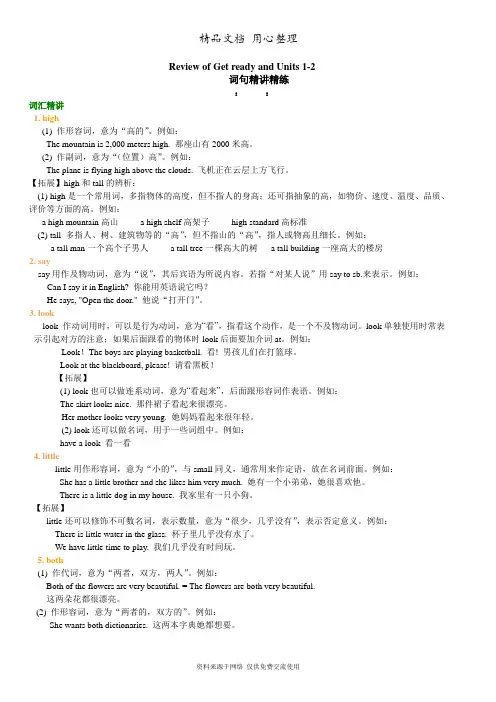
Review of Get ready and Units 1-2词句精讲精练::词汇精讲1. high(1) 作形容词,意为“高的”。
例如:The mountain is 2,000 meters high. 那座山有2000米高。
(2) 作副词,意为“(位置)高”。
例如:The plane is flying high above the clouds. 飞机正在云层上方飞行。
【拓展】high和tall的辨析:(1) high是一个常用词,多指物体的高度,但不指人的身高;还可指抽象的高,如物价、速度、温度、品质、评价等方面的高。
例如:a high mountain高山 a high shelf高架子high standard高标准(2) tall 多指人、树、建筑物等的“高”,但不指山的“高”,指人或物高且细长。
例如:a tall man一个高个子男人 a tall tree一棵高大的树 a tall building一座高大的楼房2. saysay用作及物动词,意为“说”,其后宾语为所说内容。
若指“对某人说”用say to sb.来表示。
例如:Can I say it in English? 你能用英语说它吗?He says, "Open the door." 他说“打开门”。
3. looklook 作动词用时,可以是行为动词,意为“看”,指看这个动作,是一个不及物动词。
look单独使用时常表示引起对方的注意;如果后面跟看的物体时look后面要加介词at。
例如:Look!The boys are playing basketball. 看! 男孩儿们在打篮球。
Look at the blackboard, please! 请看黑板!【拓展】(1) look也可以做连系动词,意为“看起来”,后面跟形容词作表语。
例如:The skirt looks nice. 那件裙子看起来很漂亮。
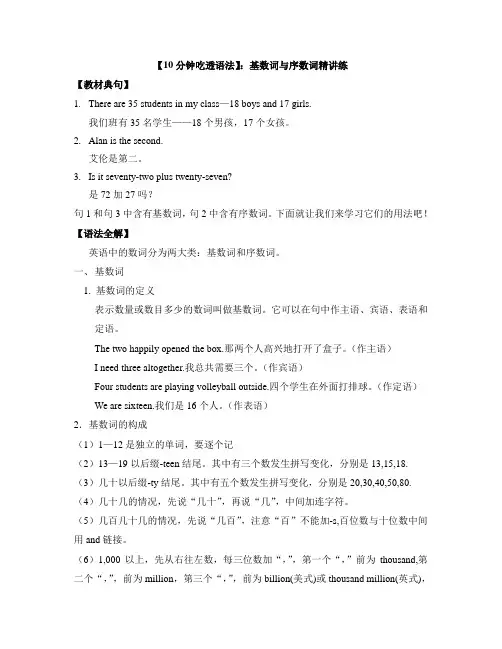
【10分钟吃透语法】:基数词与序数词精讲练【教材典句】1.There are 35 students in my class—18 boys and 17 girls.我们班有35名学生——18个男孩,17个女孩。
2.Alan is the second.艾伦是第二。
3.Is it seventy-two plus twenty-seven?是72加27吗?句1和句3中含有基数词,句2中含有序数词。
下面就让我们来学习它们的用法吧!【语法全解】英语中的数词分为两大类:基数词和序数词。
一、基数词1. 基数词的定义表示数量或数目多少的数词叫做基数词。
它可以在句中作主语、宾语、表语和定语。
The two happily opened the box.那两个人高兴地打开了盒子。
(作主语)I need three altogether.我总共需要三个。
(作宾语)Four students are playing volleyball outside.四个学生在外面打排球。
(作定语)We are sixteen.我们是16个人。
(作表语)2.基数词的构成(1)1—12是独立的单词,要逐个记(2)13—19以后缀-teen结尾。
其中有三个数发生拼写变化,分别是13,15,18. (3)几十以后缀-ty结尾。
其中有五个数发生拼写变化,分别是20,30,40,50,80. (4)几十几的情况,先说“几十”,再说“几”,中间加连字符。
(5)几百几十几的情况,先说“几百”,注意“百”不能加-s,百位数与十位数中间用and链接。
(6)1,000以上,先从右往左数,每三位数加“,”,第一个“,”前为thousand,第二个“,”,前为million,第三个“,”,前为billion(美式)或thousand million(英式),然后一节一节地表示。
3.基数词的主要用法(1)用于名词前表示数量的多少。
I have three pens.我有3支钢笔。
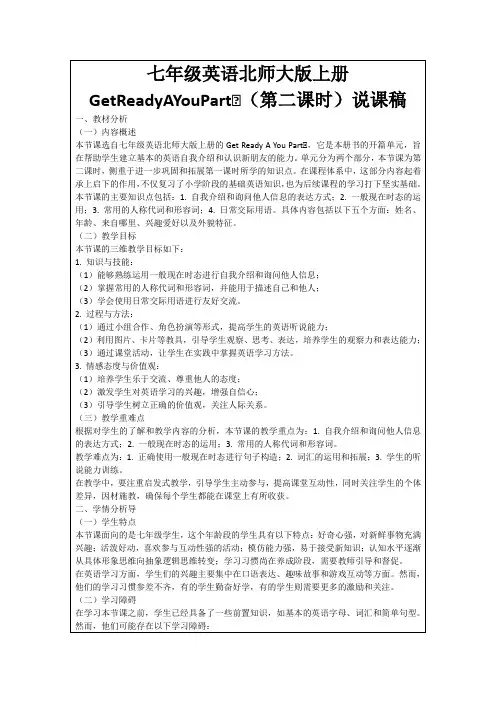
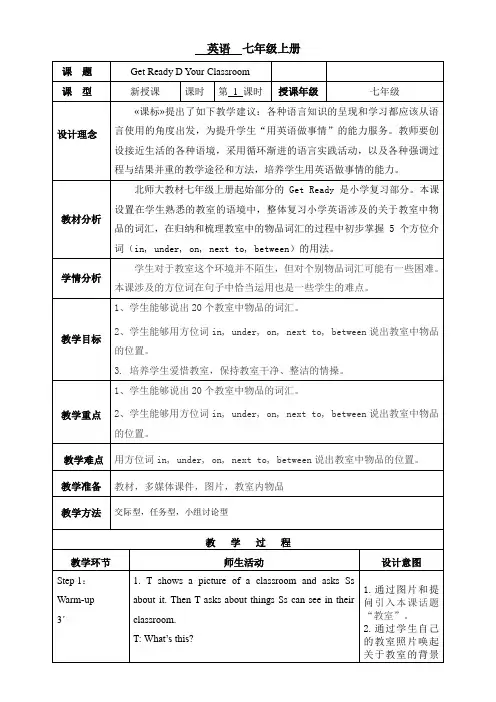
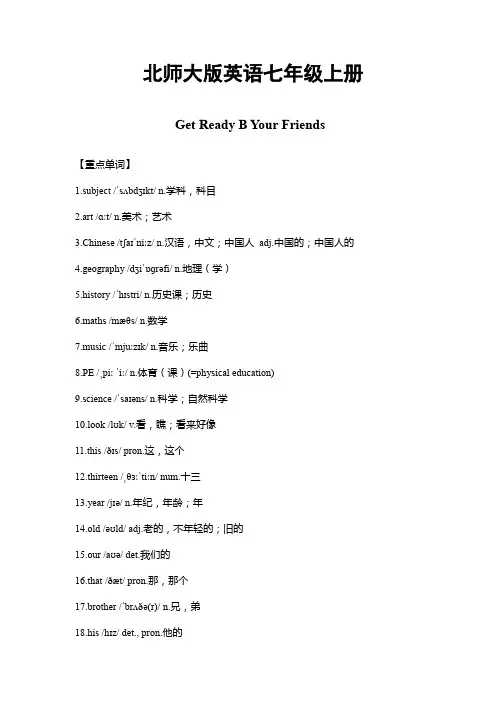
北师大版英语七年级上册Get Ready B Your Friends【重点单词】1.subject /ˈsʌbdʒɪkt/ n.学科,科目2.art /ɑːt/ n.美术;艺术3.Chinese /tʃaɪˈniːz/ n.汉语,中文;中国人adj.中国的;中国人的4.geography /dʒiˈɒɡrəfi/ n.地理(学)5.history /ˈhɪstri/ n.历史课;历史6.maths /mæθs/ n.数学7.music /ˈmjuːzɪk/ n.音乐;乐曲8.PE /ˌpiː ˈiː/ n.体育(课)(=physical education)9.science /ˈsaɪəns/ n.科学;自然科学10.look /lʊk/ v.看,瞧;看来好像11.this /ðɪs/ pron.这,这个12.thirteen /ˌθɜːˈtiːn/ num.十三13.year /jɪə/ n.年纪,年龄;年14.old /əʊld/ adj.老的,不年轻的;旧的15.our /aʊə/ det.我们的16.that /ðæt/ pron.那,那个17.brother /ˈbrʌðə(r)/ n.兄,弟18.his /hɪz/ det., pron.他的19.at /æt/ prep.在(某处);在(某时间或时刻)20.sport /spɔːt/ n.体育运动21.favourite /ˈfeɪvərɪt/ adj.最喜欢的n.最喜欢的人或物22.city /ˈsɪti/ n.都市,城市23.family /ˈfæməlɪ/ n.家;家庭24.one /wʌn/ num.一25.sister /ˈsɪstə(r)/ n.姐,妹26.their /ðeə/ det.他们的;她们的;它们的27.its /ɪts/ det., pron它的28.two /tuː/ num.二29.three /θriː/ num.三30.four /fɔː(r)/ num.四31.five /faɪv/ num.五32.six /sɪks/ num.六33.seven /ˈsevn/ num.七34.eight /eɪt/ num.八35.nine /naɪn/ num.九36.ten /ten/ num.十37.eleven /ɪˈlevn/ num.十一38.twelve /twelv/ num.十二39.fourteen /ˌfɔːˈtiːn/ num.十四40.fifteen /ˌfɪfˈtiːn/ num.十五41.sixteen /ˌsɪksˈtiːn/ num.十六42.seventeen /ˌsevnˈtiːn/ num.十七43.eighteen /ˌeɪˈtiːn/ num.十八44.nineteen /ˌnaɪnˈtiːn/ num.十九45.twenty /ˈtwenti/ num.二十46.how /haʊ/ adv.怎样;如何47.about /əˈbaʊt/ prep.关于,对于adv.大约;左右48.tall /tɔːl/ adj.高的,高大的49.fine /faɪn/ adj.健康的,身体好的;高质量的,好的;晴朗的50.thanks /θæŋks/ excl., n.谢谢,感谢51.very /ˈveri/ adv.很,非常52.well /wel/ adj.健康,身体好adv.好excl.嗯,噢53.thank /θæŋk/ v.谢谢,感谢54.much /mʌtʃ/ adv.非常,很55.welcome /ˈwelkəm/ adj.令人愉快的,受欢迎的v.欢迎56.Mr /ˈmɪstə(r)/ n.先生57.here /hɪə/ adv.这里;在这里58.book /bʊk/ n.书,书籍59.happy /ˈhæpi/ adj.快乐的;高兴的60.birthday /ˈbɜːθdeɪ/ n.生日61.today /təˈdeɪ/ adv., n.今天62.some /sʌm/ det.一些,若干63.balloon /bəˈluːn/ n.气球64.straight /streɪt/ adv.笔直地adj.直的65.turn /tɜːn/ v.(使)改变方向,转弯;转身66.left /left/ adv.向左adj.左边的67.right /raɪt/ adv.向右adj.右边的;正确的;适当的68.library /ˈlaɪbrərɪ/ n.图书馆69.little /ˈlɪtl/ adj.年幼的;小的70.often /'ɒfn/ adv.时常,常常71.word /wɜːd/ n.单词,词72.with /wɪð/ prep.和……在一起;和;用73.sound /saʊnd/ n.声音;声响74.like /laɪk/ prep.像v.喜欢【重点短语】1.be good at 擅长2.go straight 直走3.turn left 左转4.turn right 右转【重点句型】1.This is my friend ... 这是我的朋友……2.She is ... years old. 她……岁了。
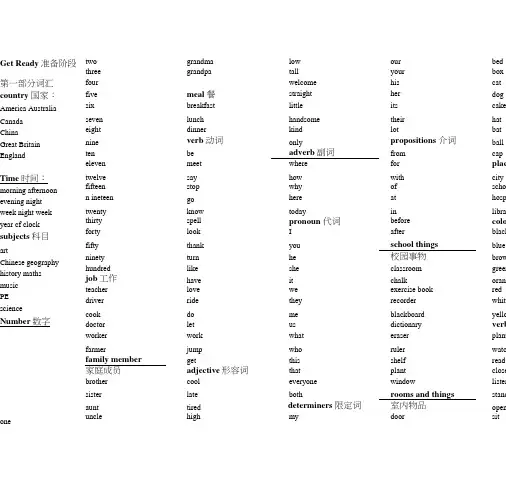
Get Ready准备阶段第一部分词汇country 国家:America Australia Canada China Great Britain EnglandTime时间:morning afternoon evening night week night week year cf clock subjects 科目art Chinese geography history maths music PE science Number数字one two grandma low our bed three grandpa tall your box four welcome his cat five meal 餐straight her dog six breakfast little its cakeseven lunch handsome their hat eight dinner kind lot bat nine verb动词only propositions 介词ball ten be adverb副词from cap eleven meet where for plac twelve say how with city fifteen stop why of scho n ineteen go here at hosptwenty know today in libra thirty spell pronoun 代词before colo forty look I after black fifty thank you school things blue ninety turn he 校园事物brow hundred like she classroom green job工作have it chalk orang teacher love we exercise book red driver ride they recorder whitecook do me blackboard yello doctor let us dictionary verb worker work what eraser plant farmer jump who ruler watc family member get this shelf read 家庭成员adjective形容词that plant close brother cool everyone window listensister late both rooms and things stand aunt tired determiners 限定词室内物品open uncle high my door sitbrush write talk tell againtherepronouns 代词half 第二部分短语be good at 擅长nextto 在.••旁第三部分句型1 • Where are you from?2. What's your name?answer these 边 3. Nancy is/ isift late for come thosesee determiner 限定词stand up 起立her class.play manylook at 看… 4. How old is she?want some 5. How / What about...?be from 来自give prepositions 7ri p J 6 Whereas the adjective形容词under be late for schoolfast next to 上学迟到7. My favourite subjects real on are…small between say goodbye to 说再见8. They both love reading black up in the morning 在早上books.blue downbrown in the afternoon 在下午9. He knows a lot about green in the evening 在晚上Chinese.orangereelin English 用英语10. What does he do? white between….and・・・11 ・ What time is it? yellow 在…和…之间12. It's time for…hot listen to 听…13.1 have breakfast at 6:30.cola quick tell sb sth 14. Wei Ming has a bigslow 讲述给某人某事exercise ball・light 15. What's this in English? adverb副词come in进来16- Listen to me.often very much 非常17. What colour is the wordtoo much a lot of大量,许多"gwerT?really over there在那边基础练习(1):一、翻译下列短语:来自… ________________________ 我的名字_______________________在下午 ________________________ 在早晨________________________说再见 ________________________ 晚上好_________________________晚安 __________________________ 做某事迟到_________________________二、根据句意和首字母提示完成单词:1 • Jerry does a lot of housework today. He is t ____________ ・2.Nancy says she isntl __________ f or class.3.You say s ______ and I say go, go, go.4.N _____ to meet you.5.Good n ________ .6.My a _______ is from America. My uncle is from America, too.7.Are you f _______ Great Britain?8.Sally and Rick are John's f _________ .三、用be的适当形式填空。
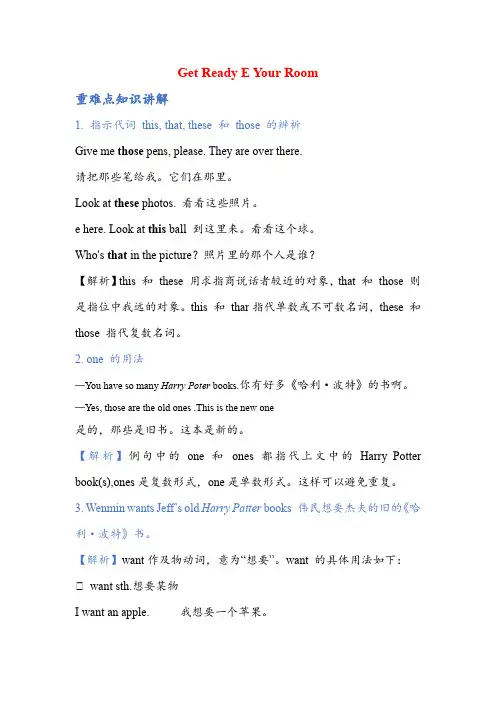
Get Ready E Your Room重难点知识讲解1. 指示代词this, that, these 和those 的辨析Give me those pens, please. They are over there.请把那些笔给我。
它们在那里。
Look at these photos. 看看这些照片。
e here. Look at this ball 到这里来。
看看这个球。
Who's that in the picture?照片里的那个人是谁?【解析】this 和these 用求指商说话者较近的对象,that 和those 则是指位中我远的对象。
this 和thar指代单数或不可数名词,these 和those 指代复数名词。
2. one 的用法—You have so many Harry Poter books.你有好多《哈利·波特》的书啊。
—Yes, those are the old ones .This is the new one是的,那些是旧书。
这本是新的。
【解析】例句中的one 和ones 都指代上文中的Harry Potter book(s),ones是复数形式,one是单数形式。
这样可以避免重复。
3. Wenmin wants Jeff’s old Harry Patter books 伟民想要杰夫的旧的《《哈利·波特》书。
【解析】want作及物动词,意为“想要”。
want 的具体用法如下:①want sth.想要某物I want an apple.我想要一个苹果。
①want to do sth. 想要做某事Tom wants to find a good job.汤姆想找个好工作。
①want sb.to do sth.想要某人做某事I want you to help me.我想让你帮助我。
4. You have so many Harry Potter books. 你有如此多的《哈利•波特》书。
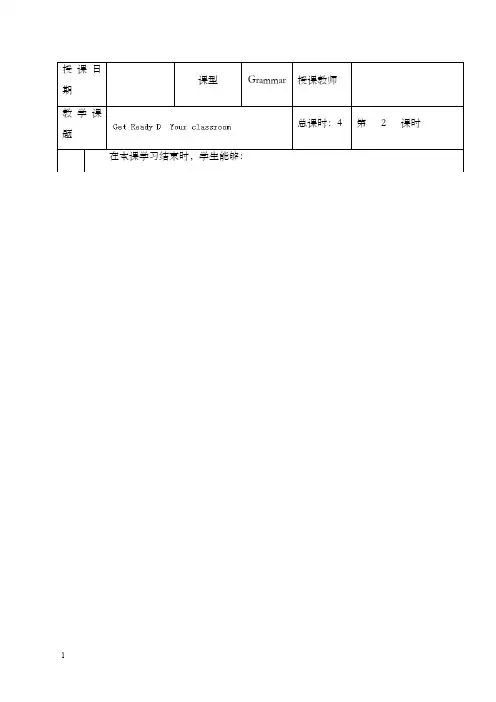
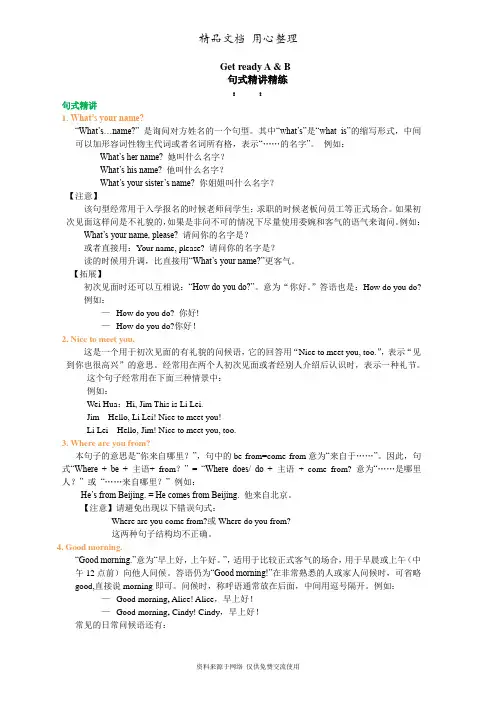
Get ready A & B句式精讲精练::句式精讲1. What’s your name?“What’s…name?” 是询问对方姓名的一个句型。
其中“what’s”是“what is”的缩写形式,中间可以加形容词性物主代词或者名词所有格,表示“……的名字”。
例如:What’s her name? 她叫什么名字?What’s his name? 他叫什么名字?What’s your sister’s name? 你姐姐叫什么名字?【注意】该句型经常用于入学报名的时候老师问学生;求职的时候老板问员工等正式场合。
如果初次见面这样问是不礼貌的,如果是非问不可的情况下尽量使用委婉和客气的语气来询问。
例如:What’s your name, please?请问你的名字是?或者直接用:Your name, please? 请问你的名字是?读的时候用升调,比直接用“What’s your name?”更客气。
【拓展】初次见面时还可以互相说:“How do you do?”。
意为“你好。
”答语也是:How do you do?例如:—How do you do? 你好!—How do you do?你好!2. Nice to meet you.这是一个用于初次见面的有礼貌的问候语,它的回答用“Nice to meet you, too.”,表示“见到你也很高兴”的意思。
经常用在两个人初次见面或者经别人介绍后认识时,表示一种礼节。
这个句子经常用在下面三种情景中:例如:Wei Hua:Hi, Jim This is Li Lei.Jim Hello, Li Lei! Nice to meet you!Li Lei Hello, Jim! Nice to meet you, too.3. Where are you from?本句子的意思是“你来自哪里?”,句中的be from=come from意为“来自于……”。
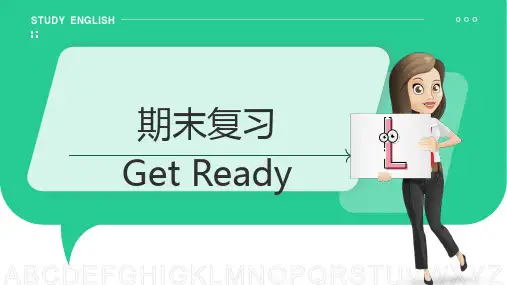
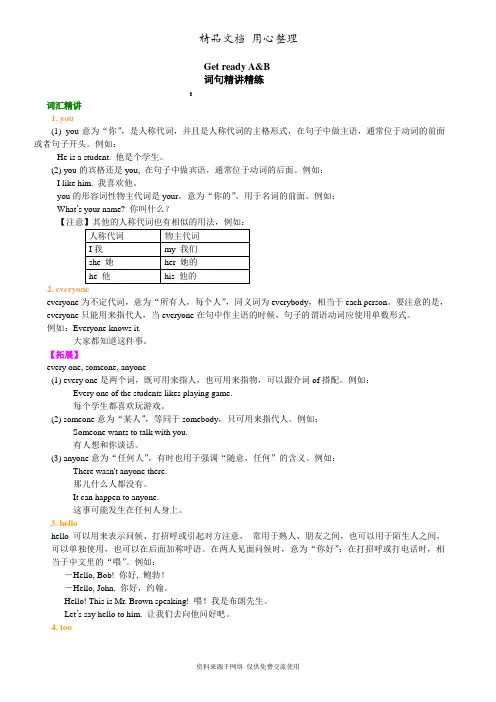
Get ready A&B词句精讲精练:词汇精讲1. you(1) you意为“你”,是人称代词,并且是人称代词的主格形式,在句子中做主语,通常位于动词的前面或者句子开头。
例如:He is a student. 他是个学生。
(2) you的宾格还是you, 在句子中做宾语,通常位于动词的后面。
例如:I like him. 我喜欢他。
you的形容词性物主代词是your,意为“你的”。
用于名词的前面。
例如:What’s your name? 你叫什么?2. everyoneeveryone为不定代词,意为“所有人,每个人”,同义词为everybody,相当于each person。
要注意的是,everyone只能用来指代人,当everyone在句中作主语的时候,句子的谓语动词应使用单数形式。
例如:Everyone knows it.大家都知道这件事。
【拓展】every one, someone, anyone(1) every one是两个词,既可用来指人,也可用来指物,可以跟介词of搭配。
例如:Every one of the students likes playing game.每个学生都喜欢玩游戏。
(2) someone意为“某人”,等同于somebody,只可用来指代人。
例如:Someone wants to talk with you.有人想和你谈话。
(3) anyone意为“任何人”,有时也用于强调“随意,任何”的含义。
例如:There wasn't anyone there.那儿什么人都没有。
It can happen to anyone.这事可能发生在任何人身上。
3. hellohello可以用来表示问候、打招呼或引起对方注意,常用于熟人、朋友之间,也可以用于陌生人之间,可以单独使用,也可以在后面加称呼语。
在两人见面问候时,意为“你好”;在打招呼或打电话时,相当于中文里的“喂”。
Get Ready Topic C Your Family名词Nouns1. member成员e.g.: We interviewed each individual member of the community.2. aunt姑母;姨母;伯母;婶母;舅母e.g.: I have an aunt. She is my mum’s sister.3. grandma (外)祖母;奶奶;外婆e.g.: My grandma and grandpa are over 60 years old.4. grandpa (外)祖父;爷爷;外公e.g.: That’s my grandpa.5. uncle舅父;叔父;伯父;姑父;姨父e.g.: I’m going to visit my uncle.6. photo 照片e.g.: I’ll take a photo of you.7. week星期,周e.g.: What day of the week is it?8. man 成年男子,男人e.g.: I took the man with him to be his father.9. bike 自行车(=bicycle)e.g.: I usually go to work by bike.10. job工作e.g.: He’s trying to get a job.11. bus 公共汽车,巴士e.g.: I didn’t take the first bus.12. driver驾驶员,司机e.g.: It only takes one careless driver to cause an accident.13. doctor医生,大夫e.g.: Her father is a doctor.14. factory 工厂e.g.: The factory closed its doors for the last time in 2002.15. worker工人;工作者e.g.: She’s a good little worker.16. farmer农场主;农人e.g.: There once was a poor farmer who had four sons.17. nurse护士e.g.: I believe you have a complaint against one of our nurses.18. taxi出租车e.g.: I came home by taxi.19. medicine药e.g.: Prevention also plays a central role in traditional medicine.20. number数字,数e.g.: The number of new students decreased from 210 to 160 this year.21. tree树,树木e.g.: Look! It’s going up that tree.22. hospital医院e.g.: Sara’s grandpa works in a hospital.23. o’clock(表示整点)……点钟e.g.: He left between five and six o’clock.24. breakfast早餐e.g.: Joe’s breakfast time is before 7.25. dinner(中午或晚上吃的)正餐e.g.: It’s time for dinner.26. lunch午餐e.g.: I’m ready for some lunch.27. bedtime就寝时间e.g.: Susan’s bedtime is before 11.28. pencil铅笔e.g.: I’ll get a pencil and paper.29. boy男孩e.g.: I used to play here as a boy.30. cat猫e.g.: The cat stayed well out of range of the children.31. girl女孩,姑娘e.g.: She saved a little girl from falling into the water.32. dog狗e.g.: I took the dog for a walk.33. pen笔;钢笔e.g.: Please write in pen on both sides of the paper.34. cake蛋糕e.g.: She offered us five different kinds of cake.35. hat(带檐的)帽子e.g.: The hat is part of the school uniform.36. ball球e.g.: She just managed to keep the ball in play.37. cap帽子e.g.: She tucked her hair under the cap.38. bat蝙蝠;球拍e.g.: At dusk bats appear in vast numbers.动词Verbs1. have 有;吃;喝e.g.: He had a new car and a boat.2. love爱;热爱;喜爱e.g.: If you love each other, why not get married?3. ride骑(马、自行车)e.g.: I learnt to ride as a child.4. let让e.g.: Don’t let her upset you.5. jump跳,跃e.g.: She jumped down from the chair.6. get获得,得到e.g.: Where did you get that skirt?形容词Adjectives1. handsome 英俊的e.g.: The handsome man is my uncle.2. big年龄较大的;大的e.g.: Uncle Tim is Aunt May’s big brother.副词Adverbs1. really 确实,的确e.g.: What do you really think about it?代词Pronouns1. who 谁,什么人e.g.: Who is that woman?2. us我们e.g.: She gave us a picture as a wedding present.3. both两个都e.g.: They both love riding bikes.介词Prepositions1. of 属于(某人或某事);关于(某人或某事)e.g.: Can’t you throw out that old bike of Tommy’s?2. over超过;在……的远端;在……的上面;遍及e.g.: She stayed in the town for over a month.3. before在……以前;在……前面e.g.: He arrived before me.4. after(时间)在……后e.g.: Ben’s Chinese class is after 9.冠词Articles1. an 一(人、事、物)e.g.: Listening is an important part of the job.数词Numbers1. thirty 三十2. forty四十3. fifty 五十4. sixty六十5. seventy七十6. eighty八十7. ninety九十8. hundred一百兼类词Words with Multiple Part of Speech1. cook n.厨师v.烹调e.g.: Where did you learn to cook?2. do v. & aux.做,干,办(某事)e.g.: We will do what we can to help.3. kind adj.体贴的;慈祥的;友好的n.种类e.g.: You’ve been very kind.4. only adj.仅有的;唯一的adv.只;仅e.g.: She’s their only daughter.5. work v.从事……工作;干活,劳动n.工作e.g.: He is working on a new novel.其他Others1. lot det.许多,大量e.g.: He knows a lot about Chinese medicine.短语Expressions1. a lot 大量,许多;很,非常e.g.: However you look at it, it’s going to cost a lot.。
a与an的用法a用于辅音前;an用于元音前。
a是用在辅音开始的词前,an是用在元音开始的词前,"元音”指的是元音音素而不是元音字母,一般说来,元音字母发元音,辅音字母发辅音,但需请注意以下3点:1. 拼写以辅音字母开头读音却以元音开头的单词hour, honest, honor等单词的拼写虽然以辅音字母h开头,但其读音却以元音开头,因此,前面要用an。
可熟记下面这句话:An hour ago, an honest man accepted an honorable task. (一小时前,一位诚实的人接受了一项光荣的任务。
)2. 拼写以元音字母开头读音却以辅音开头的单词useful, university, usual, European, united, one-eyed, one-way 等单词的拼写虽然以元音字母开头,但其读音却以辅音开头,因此,前面要用a。
可熟记下面这句话:In a university, a European and a one-eyed man walk along a one-way road with a usual tool. This is a usual thing. (在一所大学里,有一个欧洲人和一个独眼龙拿着有用的工具沿着一条单行道行走,这是件平常的事。
)如:Five years ago her brother was ________ university student of ________ physics. (上海卷)A. a; theB. an; theC. an; /D. a; /【分析】答案选D。
因为university是以辅音开头的要用a,排除B和C;physics是学科名词,前面不用冠词。
3. 英文字母前用a还是用an的问题在26个英文字母中,a, e, i, o, f, h, l, m, n, r, s, x等12个字母的读音是以元音开头的,要用an,其余字母则是以辅音开头的,用a,如:Please pay attention to your spelling. You have dropped________ ”m” here. (全国卷)A. anB. theC. /D. a【分析】答案选A。
名师指导:序数词前冠词的用法
英语中序数词前的冠词问题使学习者常感困惑,现将其常见的用法作一简略归纳。
一、序数词前常用定冠词的情况
1.强调编号和顺序。
例如:
Autumn is the third season of the year.秋天是一年的第三个季节。
I will never give up,not even on the 1,000th or 10,000th try.即使再试一千次、一万次我也不放弃。
2.序数词本身用作名词(其后无其它名词)。
例如:
The first is the best of all.第一个最好。
Who was the fourth in the examination?谁在这次考试中获得第四名?
3.表示不一定居“第一位的”,如“第二(三)位”。
例如:
He is the third tallest boy in his class.他在班上身高排第三。
Canada is the second largest country in the world.加拿大在世界上属第二大国家。
二、序数词前用不定冠词的常见情况。
1.表示“又(另)一”(不侧重顺序)。
例如:
Now tell me why you took a second arrow.告诉我,为什么你手里拿着另一支箭?
Mr Lu,who is good at maths,has been called a second Hua Luogeng。
李老师擅长数学,他被称为又一个华罗庚。
2.在名次中排“第几”。
例如:
You should try to get a first or a second in the examination.你应力争在这次考试中得个第一、二名。
3.表示任何一个“第几者”。
例如:
We don’t allow a third to have a hand in this matter.我们不允许第三者插手此事。
This book reached me through a third person.这本书是由第三者转到我手中的。
4.当“分数词”用到较小的序数词时。
例如:
A third of the students failed in the exam. 有三分之一的学生在这次考试中没及格。
当分母较大时宜用one。
例如:
A nucleus is about one thousand billionth the size of an atom。
原子核的体积大约是原子的一千兆分之一。
三、序数词前省去冠词的情况
1.表示日期。
例如:
I was born on November(the)17th,1956。
我出生于1956年11月17日。
October(the)first is National Day。
十月一日是国庆节。
2.表示职位。
例如:
In Philadelphia the United States of America was born,and George Washington served as (the)first president。
费城是美国诞生的地方,同时也是乔治?华盛顿担任第一任总统的地方。
3.表示等级。
例如:
These are all of (the)seconds。
这些都是次品。
4.用于文章标题注释中。
例如:
I read the advertisement in (the)“21st Century”,an English paper。
我是在《二十一世纪》英文报上看到这则广告的。
5.用于某些街道名称中(如street,avenue等)。
例如:
He lives in 152,(the)8th street。
他住在8街152号。
四、序数词前不用冠词的情况。
1.在某些习惯用语以及专用名词前。
例如:
at first起先,first of all首先、第一,first or last迟早,from first to last自始至终,First Lady(美国)总统夫人。
2.序数词用作副词时。
例如:
His name stands first on the list。
他名列榜首。
The Temple of Heaven was first built during the Ming dynasty。
天坛始建于明朝。
3.序数记号为名词所有格、物主代词或形容词等所限定时。
例如:
Fortunately for him,his father’s second wife was kind to him too。
他很幸运,他的继母对他也很慈爱。
My first impression of London is of rain and fog and people with umbrellas。
伦敦给我的第一印象就是雨、雾和带着伞的人们。
4.由序数词与名词构成的复合形容词。
例如:
They are all second-raters。
他们都是些平庸之辈。
5.序数词用作名词复数时。
例如:These are all firsts。
这些都是一等品。